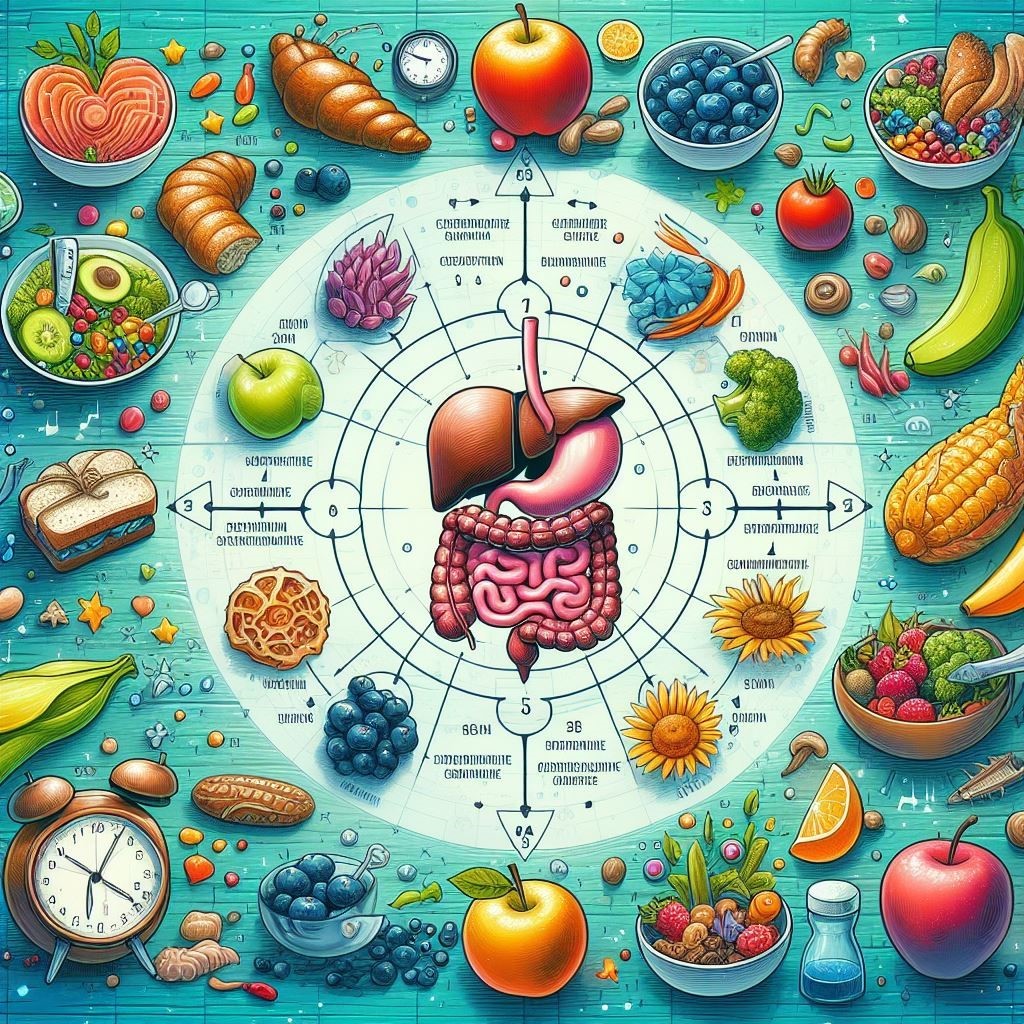Food Digestion Time Chart: Unlocking the Secrets of Digestive Harmony
Unlocking Digestive Harmony: Explore Our Food Digestion Time Chart
Explore the intricate rhythms of digestion with our Food Digestion Time Chart. Uncover the secrets to digestive harmony and optimize your culinary experience.
Introduction
Understanding how long it takes to digest different foods fully is important for promoting optimal health. Knowing which foods digest quickly vs slowly can help you make better dietary choices.
This guide will provide a food digestion time chart covering how long it takes to digest common foods from start to finish. We’ll also discuss how you can use this information to improve your digestion and overall well-being.
How the Digestive Process Works
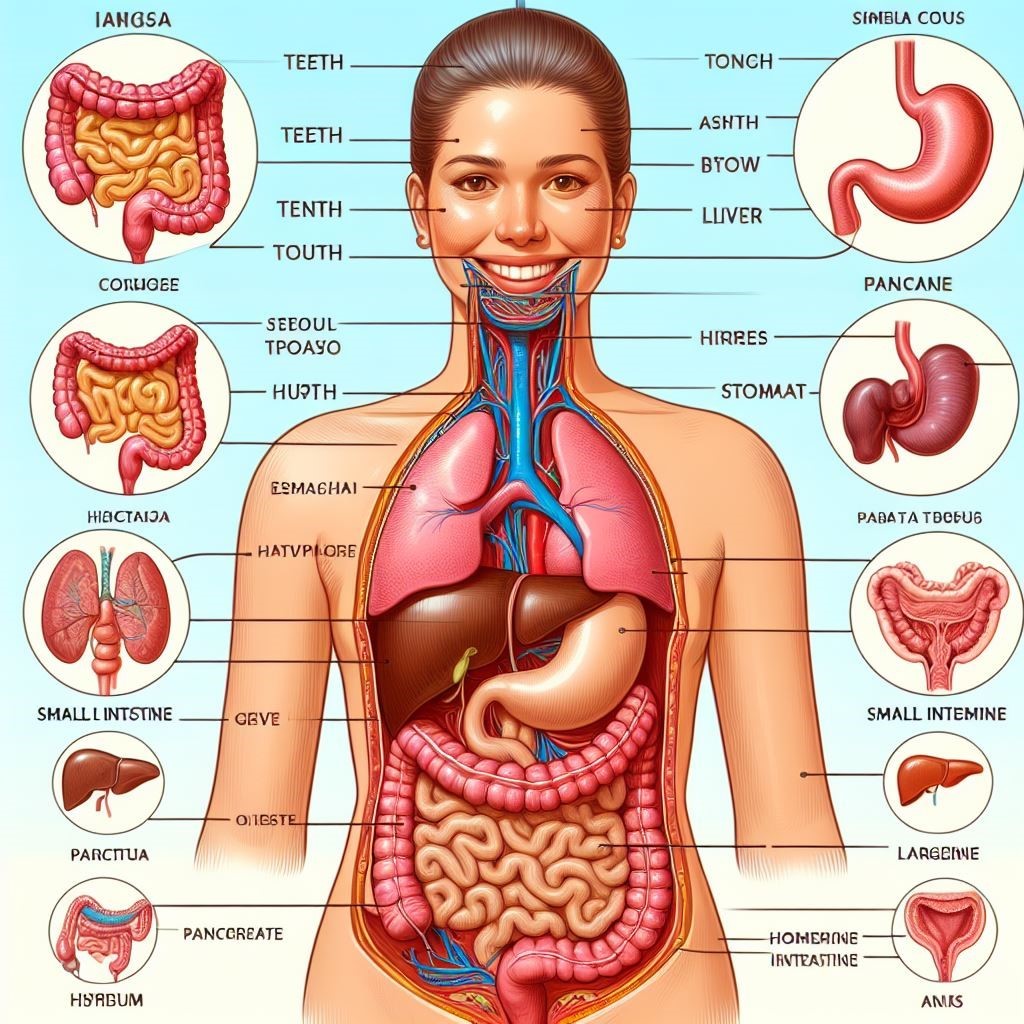
Before diving into the food digestion time chart, let’s first cover the basic stages of digestion from start to finish:
Mouth: Chewing begins mechanical digestion. Saliva contains enzymes like amylase to initiate the chemical breakdown of carbohydrates.
Stomach: Strong hydrochloric acid continues chemical digestion, breaking down proteins, fats, and carbs. Food sits in the stomach for 2-6 hours, depending on the meal.
Small intestine: Most chemical digestion occurs here via enzymes that further break down nutrients for absorption into the bloodstream. Transit time is 2-6 hours.
Large intestine: Absorbs water and electrolytes from indigestible food matter. Transit time is 30-40 hours.
Defecation: Eliminates indigestible food waste from the body as feces. Transit time varies from 12 hours to 3 days.
Now let’s see how digestion duration differs for specific foods using the following food digestion time chart.
Food Digestion Time Chart
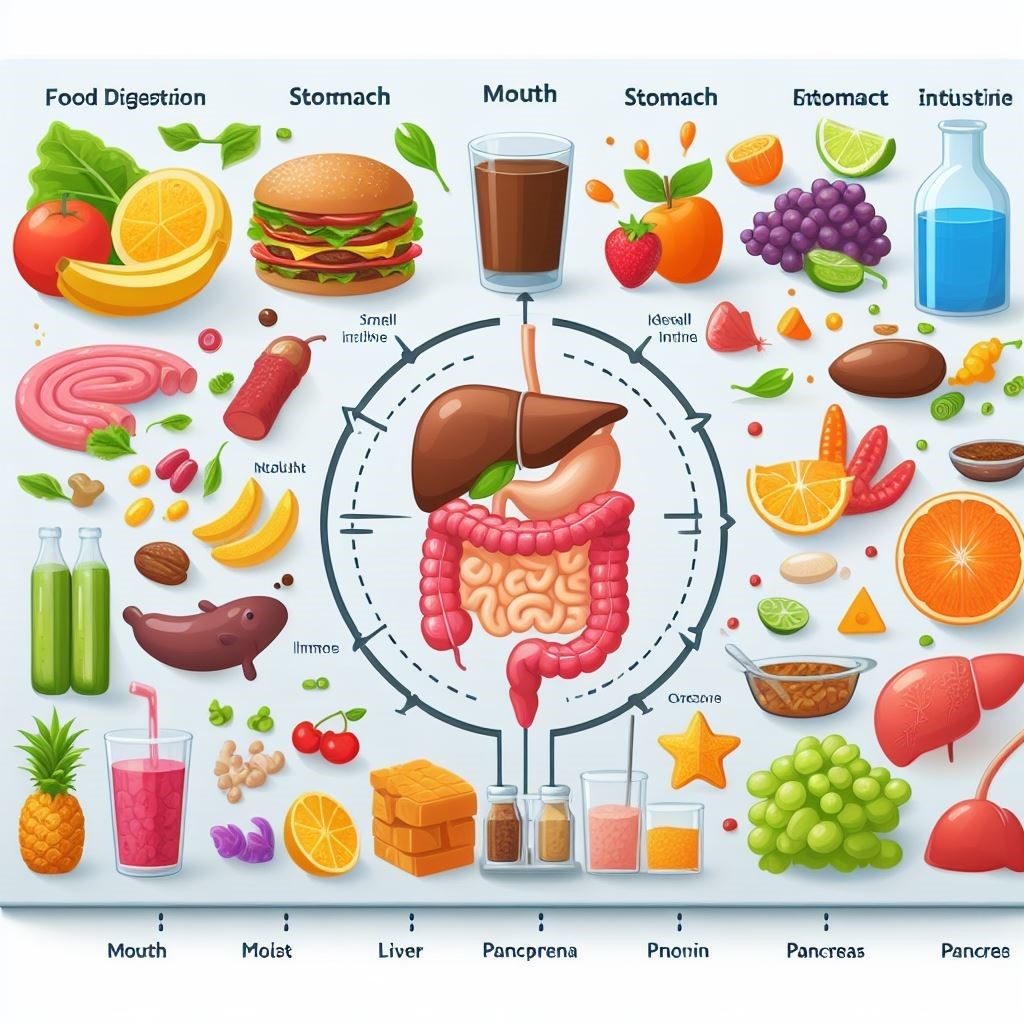
| Food Group | Time to Digest |
| Fatty foods | 8-72+ hours |
| Starches | 1-3 hours |
| Protein | 2-6 hours |
| Fruits | 0.5-2 hours |
| Vegetables | 1-3 hours |
| Legumes | 1-3 hours |
| Dairy | 2-3 hours |
| Grains | 2-5 hours |
| Nuts and seeds | 2-5 hours |
Below we’ll explore what makes certain foods slower or faster to digest.
Why Fatty Foods Are Slow to Digest
Fatty foods like:
- Oils
- Butter and cream
- Bacon and sausage
- Cheese
- Avocados
- Nuts and seeds.
- Fatty cuts of meat
- Fast food
Contains a high percentage of fat, which slows down digestion significantly. Fat molecules need to be broken down by bile salts for absorption to occur. This lengthy fat digestion time can exceed 8 hours or more.
Eating large amounts of fat triggers the release of a hormone called cholecystokinin, which shuts the stomach valve to keep food in the stomach longer. This extends total digestion time.
Fat delays stomach emptying, so fatty meals sit heavily for hours. Fat intake also stimulates the ileal brake, which slows food transit through the intestines.
Why Sugars and Starches Digest Quickly
Foods high in sugar and starch, like:
- Bread, pasta, cereals
- Potatoes, corn, carrots
- Sodas, candy, baked goods.
Digest very rapidly, in 1-3 hours. The simple sugars and starches break down easily by saliva, stomach acids, and small intestine enzymes.
The rapid entry of sugars into the bloodstream leads to surges in blood glucose and insulin. This can cause energy crashes later as blood sugar drops again.
Why Protein Takes Longer Than Carbs
Protein-rich foods like:
- Meat, poultry, fish
- Eggs, dairy products
- Beans, lentils, tofu
Require 2-6 hours for full digestion. Protein molecules are more complex, so they take longer for the body to break down into amino acids.
Some protein foods also contain fat that slows digestion. Food Digestion Time Chart, very high protein meals may exceed 6 hours for full digestion.
Fiber Delays Digestion
High-fiber foods like:
- Whole grains
- Fruits and vegetables
- Legumes
Add bulk that fills the stomach and intestines. Soluble fiber also forms a gel that slows digestion, while insoluble fiber can’t be digested at all. This increases transit time.
Foods high in fiber, such as beans, oats, and some raw veggies, are digested more slowly in 1-3 hours. This steady energy release prevents blood sugar spikes.
Liquids Digest Rapidly
Liquids like:
- Water
- Juices
- Soups
- Smoothies
Contains little to no fiber and bypasses the chewing stage. With less mechanical digestion required, liquids transit rapidly to the stomach and small intestine.
Liquids require only 15-30 minutes for gastric emptying and are absorbed by the small intestine within 1-2 hours. Very little digestion is needed before absorption into the bloodstream.
Using FFood Digestion Time Chart to Improve Health
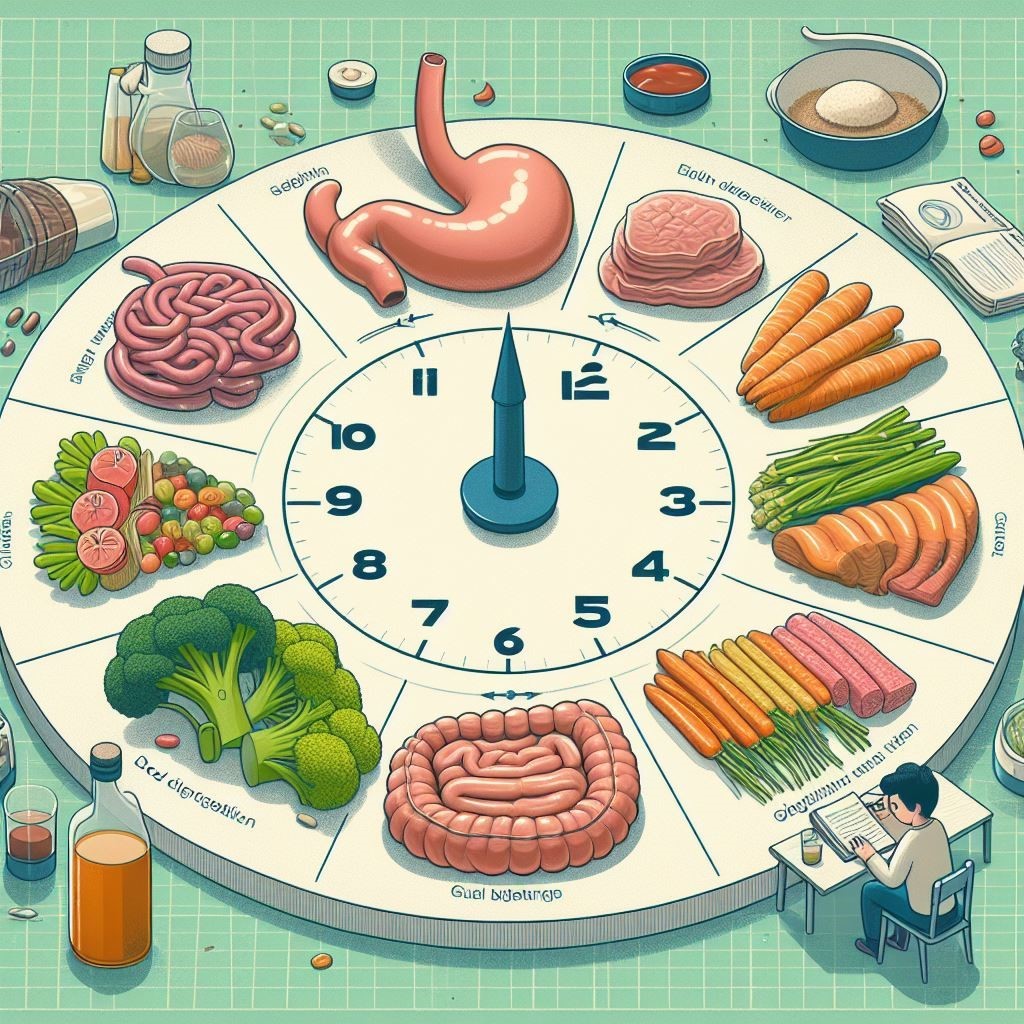
Now that you know how long different foods take to digest fully, you can use this information to promote better digestive health in the following ways:
- Avoid pairing quick and slow-digesting foods – Eat them separately to prevent digestive issues.
- Don’t eat heavy, fatty meals before bed – They can disrupt sleep and cause indigestion lying down.
- Reduce digestive strain – Limit fatty, heavy meals to 2-3x weekly max to give your digestion a break.
- Prevent energy crashes – Balance quick carbs from sugars and starches with slower digesting protein, fat, or fiber.
- Improve regularity – Ensure 30-40 grams of daily fiber from fruits, veggies, beans, and lentils.
- Limit liquefied calories – Stick to water or unsweetened tea between meals for better satiety.
- Allow 4-5 hours for full digestion before repeat eating – Let meals fully digest before snacks or the next meal.
Making informed food choices tailored to your individual digestion can promote optimal wellness. Use the above food digestion time chart as a guide to determine which foods work best with your unique digestive system.
Common Factors That Delay Digestion
Beyond the composition of foods themselves, other factors affect digestion time. Elements that typically prolong digestion include:
- Overeating – Excess food overwhelms digestion, delaying gastric emptying.
- High-fat meals – Fat digestion is slowest, so high-fat foods linger longer.
- Low fiber diets – Without soluble fiber, transit speeds up and may cause diarrhea.
- Dehydration – Inadequate fluids cause constipation and harder stools that take longer to pass.
- Sedentary lifestyle – Lack of activity slows motility and transit.
- Medications – Some drugs, like narcotics, delay gastric emptying.
- Older age – Digestion slows down as the body ages.
- Gastroparesis – Partial paralysis of the stomach stalls digestion.
- Bowel disorders – Problems like IBS or diverticulitis affect transit.
Factors that speed up digestion typically include:
- Physical activity – Gets food moving through the GI tract.
- Stress – Stress hormones increase motility and bowel contractions.
- Overconsumption of fiber, fat, or sorbitol – Can cause urgent diarrhea.
- Caffeine – Stimulates more rapid gastric emptying.
- Spicy foods – Increase motility in some people.
- Food intolerances – Can trigger faster transit of problem foods.
Tips for Improving Digestion Based on Transit Times
Understanding digestion times is vital for optimal health. Learn from our Food Digestion Time Chart to make informed dietary choices and optimize your digestion for overall well-being:
- Chew thoroughly – Allow 20-30 chews per bite to improve mechanical digestion.
- Avoid drinking with meals – Fluids dilute stomach acid needed for protein digestion.
- Limit carbs and fat together – This combo slows fat digestion and delays gastric emptying.
- Reduce portion sizes – large meals overwork the stomach and digestive system.
- Limit snacking between meals – Constant grazing doesn’t allow full digestion of a previous meal.
- De-stress before eating – Stress hormones divert blood flow away from digestion.
- Don’t exercise vigorously after meals – Activity draws blood away from the digestive process.
- Experiment to find your ideal meal spacing – Allow 4-6 hours for full digestion before the next meal.
- Consider a digestive enzyme or HCL supplement – Can help break down protein, fat, carbs, and fiber.
Using a food digestion time chart as your guide, you can learn which dietary habits align best with your body’s innate transit times. This knowledge is key to unlocking the secrets of digestive harmony!
Potential issues with digestion
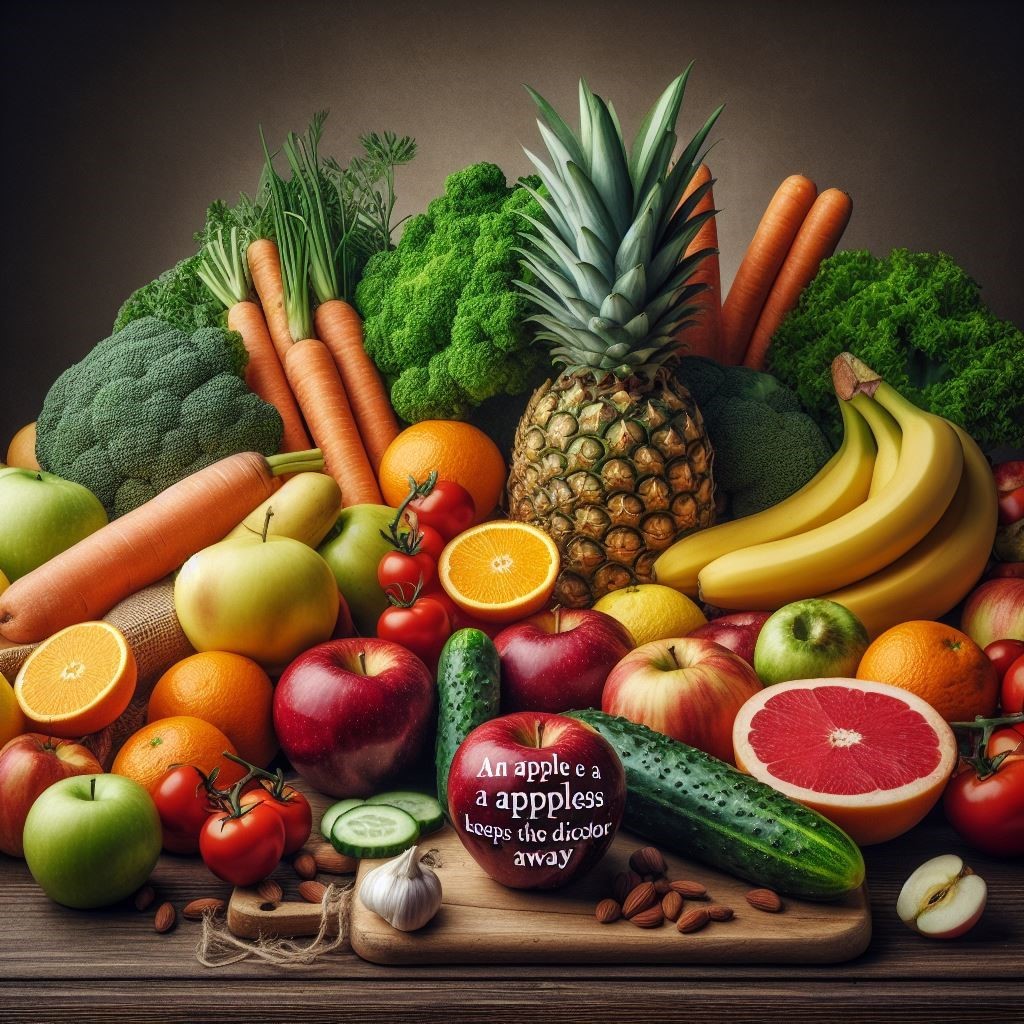
One key aspect of digestive health involves understanding normal transit times – how long it takes foods to digest from start to finish fully. Not knowing the typical food digestion time chart can lead to some common issues:
- Eating too fast and not chewing thoroughly can make food harder to digest. Proper mechanical digestion via thorough chewing helps break down carbohydrates and fats.
- Drinking liquids with meals dilutes digestive enzymes and stomach acid needed to break down foods. It’s best to avoid gulping fluids with meals.
- Overeating or eating heavy, fatty, rich foods overburdens the digestive organs. This slows down digestion and can lead to reflux, bloating, and nausea.
- Snacking constantly between meals doesn’t allow enough time for complete digestion. It’s best to allow 4-6 hours between mealtimes.
- High-fiber foods may cause gas, bloating, or diarrhea if consumed in excess, especially for those unaccustomed to much fiber. Gradually increase high-fiber foods.
- Combining quick-digesting carbs and slow-digesting fats can delay gastric emptying and cause indigestion. Limit carbs and fat to main meals.
- Eating a large meal and then lying down soon after can bring on heartburn. Don’t eat heavy meals 2-3 hours before bedtime.
- Traveling across time zones disrupts the body’s digestion rhythm. Be gentle with your diet until you adjust to the new time zone.
- Stress negatively affects digestion, slowing motility. Make time to decompress before and after eating. Deep breathing helps too.
FAQs about Food Digestion Time Chart
Here are the common frequently asked questions about the Food Digestion Time Chart and the best answers for them.
What is the normal time to digest food?
The total time for full digestion ranges from 24-72 hours, depending on the foods eaten. On average, a mixed meal takes 4-5 hours to digest for the next meal. Foods high in fat, fiber, or protein take longer, while carbs and liquids digest more quickly.
Can food digest in 2 hours?
Yes, foods high in sugars and refined carbs can be digested in the stomach and small intestine within 2 hours or less. Foods like bread, crackers, pasta, soda, candy, and juices digest rapidly and can then be absorbed into the bloodstream.
Which food takes the most time to digest?
Fatty foods like oils, avocados, nuts, seeds, fatty cuts of meat, cheese, and fast food can take the longest to digest – up to 72 hours or more fully. The high-fat content requires more time for the bile salts to break down the fatty acids.
Does food digest in 30 minutes?
Most foods require more than 30 minutes for complete digestion. However, some liquids like water or clear juices may pass through the stomach within 15-30 minutes. Smoothies and very light snacks may also be digested within 30 minutes. But larger, more complex meals need several hours.
Let me know if you need any clarification or have additional questions on normal food digestion times! I’m happy to provide more details in a simple, conversational way.
Conclusion about Food Digestion Time Chart
Understanding the typical transit times for food digestion is key to promoting better digestive health. Knowing which foods digest quickly versus slowly enables you to make informed dietary choices that align with your body’s innate rhythms.
Follow the food digestion time chart provided to learn the optimal spacing between meals and snacks based on how long full digestion takes. Be sure to chew thoroughly, avoid drinking excess fluids with meals, manage portions, and reduce big combinations of carbs and fats that delay gastric emptying.
Making small tweaks to your eating schedule and meal composition tailored to normal digestion durations can promote harmony between your diet and digestive system. Honor your body’s innate digestive wisdom by giving it the necessary time and space to extract nutrients and eliminate waste effectively. Support your digestion’s natural sequence of activity through mindful eating practices.

